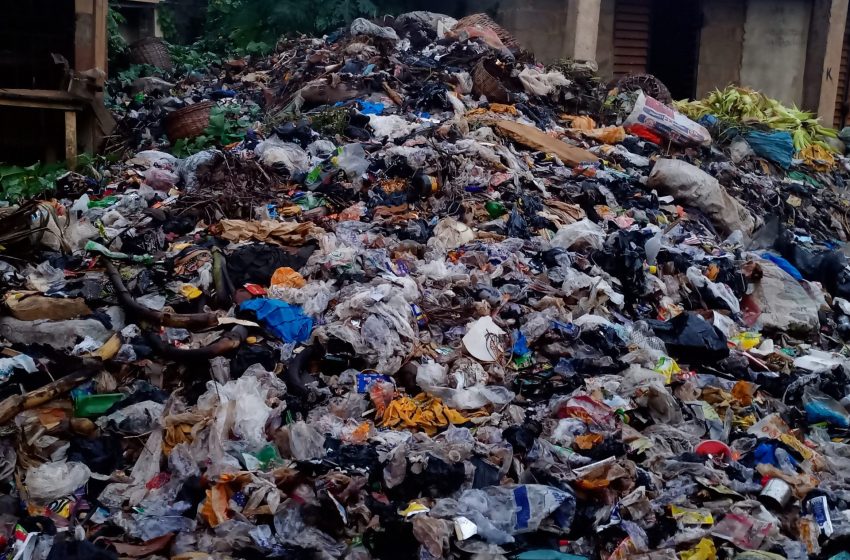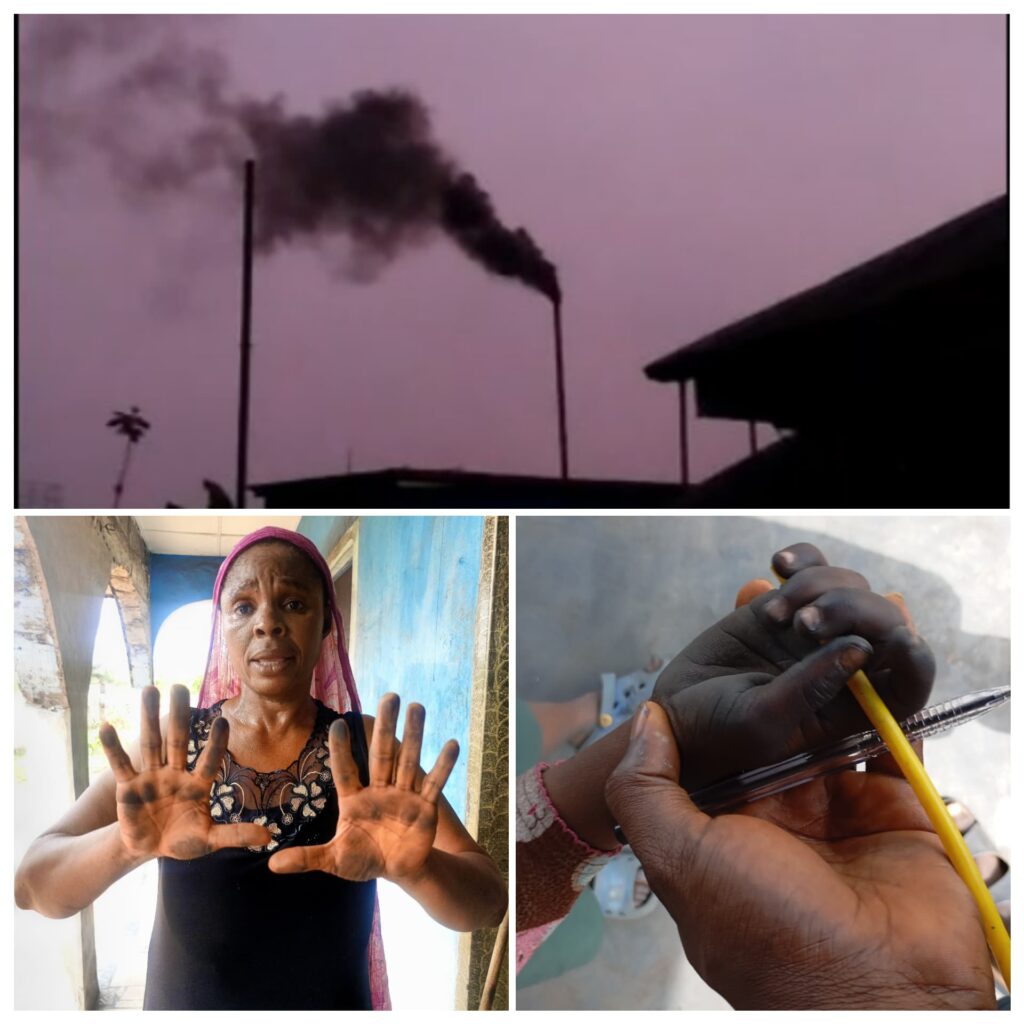INVESTIGATION: In Ogun town, lives, environment threatened as govt collects sanitation levies without clearing refuse

Illegal dumpsite Photo credit- Blessing Chukwuneke
Indiscriminate waste disposal is a chronic reality in Lusada, a hustling and bustling town in Ado Odo/Ota Local Government Area of Ogun state. In this report, CRISPNG’s BLESSING CHUKWUNEKE documents how this threatens the environment and health of residents and how government agency tasked with cleaning the environment collects sanitation levies without giving value in return.
That sunny afternoon, this reporter was heading to complete an assignment and had to board a bus to Agbara from Lusada bus stop when something unpleasant caught her attention, it was piles of refuse on every square mile of Lusada road.
It was too striking to ignore.
Sitting inside a yellow mini-bus at about 12pm on the 13th of October, while waiting for passengers to fill the spaces, her journalistic instinct piqued her interest to probe the anomaly.
It began with a video recording.
Along Agbara road, she saw another similar site. This time, the area had a cautionary signpost placed by the Ogun State Waste Management (OGWAMA), warning people against dumping waste which was clearly not heeded. She made another video.
Lusada is a developing area located in Igbesa/Agbara Local Council Development Area (LCDA), in Ado Odo/Ota Local Government Area (LGA) of Ogun state.
Igbesa houses Ogun State Institute of Technology (OGITECH) and Crawford University and is estimated to have over a million residents.
However, in a world facing the adverse effects of climate change, the residents of Igbesa town have no proper means of waste disposal besides burning, which releases harmful toxins into the atmosphere, exacerbates pollution, and poses health and environmental hazards.
Waste is a common presence in human habitats, recognised as a necessary evil, but the crux of the issue lies in waste management.
A DIRT HUB, WELCOME TO LUSADA

Along the Lusada-Agbara road, where the Oba Adesola market popularly called Lusada market is situated, waste is carelessly dumped at various locations, on the left, right, and everywhere in between.
At the market, there is an illegal dumpsite, holding a substantial pile of refuse resting amidst a line of shops, rendering the area inhospitable.
The absence of any active stalls attests to this, primarily due to the noxious fumes emanating from the refuse dump, making it difficult to breathe within the vicinity.
The gutters are not left out as they are clogged with debris (plastic, food, paper & the like), impeding proper drainage.

The situation at Lusada market is quite similar to what you would find on its streets, with many areas filled with litter.
People also tend to create makeshift dumpsites since there’s none in Igbesa, and burning trash is a common practice. It would be a rarity to wake up to a clean market or street, as this problem has persisted for years.
Surprisingly, despite the presence of recycling companies in the Agbara area, residents more often than not do not sort or recycle their waste.
OGWAMA: TOWARDS A CLEANER OR DIRTY OGUN?
The Ogun State Waste Management (OGWAMA) offers street cleaning services, PSP services, as well as education and awareness. On its website, it listed names of private sector participation (PSP) service providers covering different areas of Ado-Odo Ota local government but their presence is not felt as garbage and Lusada are synonymous.
The companies listed include Maborious Nigeria Enterprises owned by Mrs. Kunola, covering the Igbesa Area of Igbesa Ward of Ado/ Odo. However, when contacted, she disclosed that she was not in charge of Lusada market area.
T. Cynthia Nigeria Limited, owned by Titilola Cynthia Saka, covers Ketu/Adie –Owe, from Crawford University to Alago Area including Ishaga, Eleru, Odugbe, Ketu, and Adie–Owe area.
When this reporter also contacted her, she revealed her company does not cover Lusada market area nor Ago-Alaga.

Although OGWAMA identified “cleaner Ogun, towards a cleaner environment” as its core aim on its website, the reality in Lusada LCDA is the opposite.
TRADERS, RESIDENTS LAMENT
Despite being the economic hub in Igbesa, many residents decried the lack of government waste management services in Lusada.
Mrs Mosunmola, a trader, told this reporter that there was no waste management activity in the area.
Speaking on PSP services in the area, she said: “Igbesa is where they usually go, they don’t stop here at all, previously they usually swept the junction, both morning and night, but that activity stopped due to the bad road.”
Mr Favour who runs a business at Ago-Alaga, close to the Lusada bus stop, also told the reporter that he has never heard of PSP in Ogun state.
He said Lusada road used to be swept by workers of the Chinese company commissioned to work on the road. He, however, noted that stopped for a long time.
Mrs Yusuf, another trader in the area, said: “There is no activity of PSP here, this place is a bit rural, you can still see bushes to throw refuse and burn them, unlike Lagos.
“If something like that is brought here, I don’t think it will be profitable. Though I see their vehicle, they don’t use it here, they might use it in the companies, but I’m not sure.”

Photo credit – Blessing Chukwuneke
CrispNG gathered that owners of shops located around the illegal refuse site in Lusada market have been forced to abandon the buildings due to the putrid odour oozing out of the dumpsite.
Mrs Loveth Onyenwere, one of the owners of the affected shops at the dumpsite, could not hide her frustration.
“When I started building my shop in 2020, there was no refuse in that place. Now, you can’t breathe because of the bad smell and my shop is directly affected,” she said.
She said it cost her a lot to put up the structure.
On her part, Mrs Raymond, who was also affected voiced her anger in Pidgin English.
“Ahh! Me I no dey go that place again oh, because, I’m tired,” she said.
Raymond said she made efforts to clear the dump in the past all to no avail.
“My efforts were futile as after a while, people continued dumping refuse there again,” she added.
LIKE RESIDENTS, COMMUNITY LEADERS DECRY SITUATION
To dig deep into the dump disaster, the reporter also engaged community leaders.
Chief Jimoh Talabi, the Baale of Ago-Alaga in Lusada, revealed that the government has never taken any initiative to address the sanitation issues in the environment.
He mentioned that he had informed the king about the problem, but no action had been taken.
Chief Jimoh also said OGWAMA is not operational in the area, adding that there are no other service providers of that kind.
“We have never seen such operations (from OGWAMA) here; we requested that the king bring such services, but we have received no response,” he said.

Supporting Chief Jimoh’s statement, Evangelist Rasaaki Ajose, the Olori-ebi of Ago-Alaga, confirmed that there is widespread indiscriminate dumping of refuse and a significant accumulation of waste in the market area.
He also lamented the absence of PSP services in the area and expressed disappointment in the local government executives over their alleged lack of concern.
Ajose said local “councilors don’t want to do that kind of project”.

SLIGHT IMPROVEMENT IN IGBESA BUT CONCERNS LINGER
Residents of Igbesa confirmed the activity of PSP in the area, but some showed their displeasure towards their activities.
Opeyemi, a resident, stated that the roads are usually swept and refuse taken away.
Mr Jimoh, a spare parts dealer, said once a month, they get a PSP service. The residents usually pack their refuse in a sack and place it by the roadside for pick up.
On her part, Alhaja Adunni complained about the ineffectiveness of PSP operators in the area.
“They only come here once in a while,” she fumed.
IGBESA/AGBARA LCDA SPEAKS
In an interview with CrispNG, Mr. Abiodun Dada, the head of the Igbesa/Agbara area council’s environmental department, confirmed that OGWAMA is not very effective in the area.
“They come around, but I’ve never met with the operators,” he said.
He explained that waste management matters are overseen by the local government, which assigns contracts to contractors responsible for waste disposal in the vicinity of the market area.
Mr. Dada said the contractors “collect the waste and transport it to its final disposal site.”
Mr. Dada said: “There is a huge dump of refuse at that market and I met it there. When I told my boss about it, he said he had advised them on how the heap of refuse can be carted away,” he said.
“It cannot be done manually but with the help of a payloader, which will result in the demolition of some shops to make space for the payloader to come in with the tipper to take it out, but he said they are yet to finalise on it with the market leaders.”

On waste management, he disclosed two contractors have been assigned to handle the task. He also said the contractors work in shifts based on the market day. He gave the name of one to be E E Akingbedu.
The contract was awarded to the companies by Ado-Odo/Ota LGA.
He further said: “The specifics of how they dispose of the waste are unclear to me, as the agreement was established before my appointment.
“However, If I intensify my efforts, I will be able to address this issue within a short period.”
Speaking of collaborations with the people of Igbesa, Mr. Dada confirmed that he had a meeting with HRM Oba Abdul-Azeez Oluwatoyin Akinde, FCA; the Oloja Ekun of Igbesaland, who reached out to him to discuss how to improve sanitation in the area.
When asked about the efforts he has made, Mr. Dada mentioned that the department visits the market on Thursdays, which is the designated environmental day for the Lusada market, to provide health education talks to the sellers.
He clarified that his role does not include waste management, as it has been contracted out.
On refuse disposal methods in the area, Dada noted burning is a common practice because there is no proper avenue for waste disposal.
Additionally, waste sorting is not practiced. He added that truck pushers collect refuse from people and are paid for it, but they often dump it indiscriminately, including in drainages and at odd hours.
On the way forward, he said having additional contractors and workers in the environmental department, as well as establishing a designated dumpsite would help solve the problem.
He explained that the yet-to-completed road exacerbates the issue, as waste is washed into the gutters, interfering with their work. He added that littering by the residents also contributes to the problem.
EMPTY PROMISES
In 2022, Governor Dapo Abiodun, the state governor, promised that the Agbara-Lusada-Atan road would be completed by September of that year but it did not materialise.
The governor made another promise on the 7th of April, 2023 during the 10th Gateway International Trade Fair. At the event, the governor said road construction would commence in two weeks.
Despite the promises by the governor, the road is still a nightmare for commuters.
“COLLECT YOUR TICKET TO AVOID EMBARRASSMENT” — GOVT IMPOSES SANITATION LEVIES WITHOUT OFFERING VALUE
The issue of environmental levy is one that generates huge controversy as traders in Lusada market are required to pay N100 environmental fees.

However, the people receive no value for their money as sanitation activities are not carried out except by the traders who still have to pay between N200 to N400 to cart pushers to dispose of refuse.
Mrs Rose, a dealer in female wears, stated that council officials come every other market day to collect the sum of N100 without doing any environmental sanitation.
Mama Cotonou, another trader in the market, revealed that N100 naira is collected every time the market day falls on Thursday but nothing is ever done about environmental sanitation or waste evacuation.
She also said that refuse is dumped in the area around the abandoned bridge.

Also addressing this, Mrs Bolanle said: “Refuse are thrown close to the pillars of the abandoned bridge, very close to the road which is not right. We (traders) still have to pay cart-pushers to evacuate their waste”.
Commenting on the development, Hon.Wasiu Ramon, vice-chairman of transition committee Ado-Odo Ota LGA, told CrispNG: “They usually collect environmental fee which is supposed to be used to evacuate the refuse, but I am surprised that the people in charge of the contract didn’t take it up.”
Speaking on the situation of the owners of the abandoned shops Ramon said, an available solution is for the traders to contribute between N10,000 to N20,000 to evacuate the garbage after which security operatives will be employed to ensure that people do not throw refuse there and then a letter is written to the local government.
He added the traders can also write a letter to the council for the evacuation of the waste.
Efforts to reach the contractors required to evacuate the refuse, however, proved abortive.
NIGERIA’S BATTLE WITH POOR WASTE MANAGEMENT
The reporter’s findings at Lusada, Igbesa corroborate other previous studies that examined the waste management situation in other areas of Ado-Odo/Ota LGA.
Research by David et al. (2023) revealed that “Most residents of Ota (28.6%) incinerate their wastes which… impact negatively on the ozone layer and that 11.4% deposit their wastes by the roadside, 6.4% dump their wastes in drainages and water bodies, while only 27.6% dispose theirs to public waste bins”.
A 2018 research by Ayedun et al. also showed solid waste management in Ado-Odo/Ota is mainly handled by the local government, private companies, residents and other informal stakeholders such as scavengers, local collectors, etc. The researchers found waste is burnt openly in the area.
Generally, waste management in Nigeria is very poor. An assessment carried out by the Yale Center for Environmental Law and Policy listed Nigeria among 30 countries with the worst waste management practices out of 180 countries evaluated, having scored 12.7 out of 100.
United Nations Industrial Development Organisation (UNIDO) statistics show that annually, Nigeria produces 32 million metric tonnes of waste, with 2.5 million tonnes being comprised of plastic waste. The waste generation in Nigeria is projected to rise in the coming years due to a 2.4% annual growth rate.
According to a World Bank estimate, the daily waste produced per individual in Nigeria is approximately 0.51 kilograms, and it is projected that the total waste will reach 107 million tonnes by the year 2050.
On a global scale, municipal solid waste production amounts to 2.01 billion tonnes each year, and a significant portion, approximately 33%, is not handled in an environmentally sustainable way.
Sub-Saharan Africa, South Asia, and the Middle East and North Africa regions frequently engage in open waste disposal practices. In these areas, over 50% of the total waste generated is openly dumped on the streets.
Waste management is a serious issue that needs attention. According to atmospheric scientist, Christine Wiedinmyer, over 1.1 billion tons of waste, which accounts for over 40 percent of the world’s garbage, is incinerated in open heaps.
CLIMATE EXPERTS SPEAK

Aningo Genevieve Ezinne, a Sustainability lifestyle influencer and Freelance Journalist at The Energy Republic advised against open burning.
Ezinne, who addressed the reporter’s findings, said open burning portends dangers to the environment.
Her words: “In as much as Nigeria has low carbon emissions compared to many nations all forms of open burning still need to be discouraged because it pollutes the air, impoverishes the land, and threatens biodiversity.
“Chemicals released during open burning such as dioxins and nitrogen not only disrupt the climate but can negatively impact the health of people. These toxins when inhaled by humans and can trigger cases of lung problems, bronchitis since the oxygen is clogged with impurities.
“Open burning diminishes agricultural yield since it renders the land unfit to germinate healthy harvest for human consumption. It also contributes to deforestation. Many farmers in the northern part of Nigeria have been rendered jobless due to the adverse effects of burning which made their lands sterile.
“Also, open refuse burning does not totally burn or incinerate, the tiny plastics, polyethylene and all forms of plastics find their way into the sea which also poison marine life. It’s already projected that by 2050 the number of plastics in the ocean will outnumber fish. So many plastics have been found in the belly of fishes and these fishes.
“On the other hand, poor waste management is intense in Nigeria, we rank 5th in the world among countries with the most plastic pollution. Look at our streets, nowhere is clean! Even if some parts pretend to be, take a glimpse into the gutters and you will see how waste has taken over.
“Then during the rainy season, we get the results of our poor actions. Flooding becomes the order of the day. So many people have become homeless due to the ravages of flooding.
“The adverse consequences of poor environmental management such as open burning and poor waste management are endless. The danger of these to our climate is that we would continue recording uncertainties in the climate.
“We are approaching December some parts of Nigeria with less human activities on climate have already begun to experience harmattan while places like Lagos, PortHarcourt, and Oyo are still recording heavy rains, signifying that our climate has been greatly tampered with.”
Proffering solutions, she called on Nigerians to care for the environment.
She added: “We need public awareness on the poor habits and their effects cascaded to citizens especially the rural areas or people with low educational status because are unaware that bush burning and dumping refuse can jeopardize the environment and human lives. They should be taught sustainable practices.
“I know the fanciest solution would be to tell the government to provide or working systems of good waste disposal but this solution has been reiterated for ages yet we are still here.
“However, the government needs to create eco-friendly options. These include waste collection agencies that keep to time and not wait till the waste in the market turns into a mountain! As for policies, offenders who contravene environmental laws should be punished.”
On her part, Falaiye Titilayo, founder of CEO Orange Strategy Waste Value, a waste recycling firm, said “Aside from the deleterious impact indiscriminate dumping of refuse has on the health of every individual in the market, it directly contributes to our climate changing.

“The consequences includes threat to biodiversity, greenhouse effect; as burning of waste releases hazardous chemicals into the atmosphere, reduces the amount of sunlight reflected by particles from waste burning suspending in the atmosphere and this reduction of sunlight radiation caused by acid rain can have a significant impact on climate.
“Acid rain contributes to global warming by increasing the levels of greenhouse gases in the atmosphere, changing the chemical composition of the atmosphere and damaging the ecosystems, including forests, lakes, and wetlands.
“To solve the problem she listed recycling, sensitisation of populace on how to handle waste sustainably, economic incentives from the government to individuals, implementation of waste management policies and installation of waste collection bins at specific locations.”
‘POOR WASTE DISPOSAL CREATES HEALTH RISKS’
Dr Qudus Lawal, a Consultant Obstetrician and Gynaecologist at the Irrua Specialist Teaching Hospital, Edo State, also addressed the health consequences of open burning and poor waste disposal.

He told CrispNG: “Human and industrial waste are part of development and growth, as humans produce, and consume, they create waste in the process, handling of such wastes if not properly done can be inimical and create healthcare risks in many societies including market places.
“Marketplaces generate a lot of waste including rotten or discarded food materials and cellophane bags, and it is not uncommon to see heaps of waste in marketplaces. These wastes become a breeding ground for different forms of vectors that carry diseases such as rats, they also become sources of dissemination of diseases through insects and houseflies.
“So, handling of this is important in preventing many diseases such as cholera which often results from poor hygiene, mosquitoes which malaria grow on heaps of trash, there’s also a risk of Lassa fever and a whole lot of diseases, there could also be contamination of human source of water.
“Waste management starts from the generation of waste, use exactly what is needed in manufacturing is recommended, especially using materials that can be recycled, also appropriate waste segregation and disposal.
“Recycling is also important and for those that cannot be recycled, they should be discarded appropriately through deep land burying, incineration, etc. Many countries turn their wastes to Wealth which can be replicated in Ogun state, as is being done in some states.”
LESSONS FROM LAGOS
The Lagos state government in recent times shut down the Trade Fair complex, Ile Epo, Alagbiagba market in Ajegunle, Ladipo auto spare market, Oyingbo, Oke-odo and some plazas around the Tejuosho Market over indiscriminate dumping of refuse and other environmental infractions.
This is likely to be the case in Lusada market and other areas in Ogun state if the environmental situation is not addressed quickly and efficiently.
But can Ogun replicate Lagos and wield the big stick?
This story is published under the Africa Foundation for Young Media Professionals Fellowship, supported by MacArthur Foundation.





